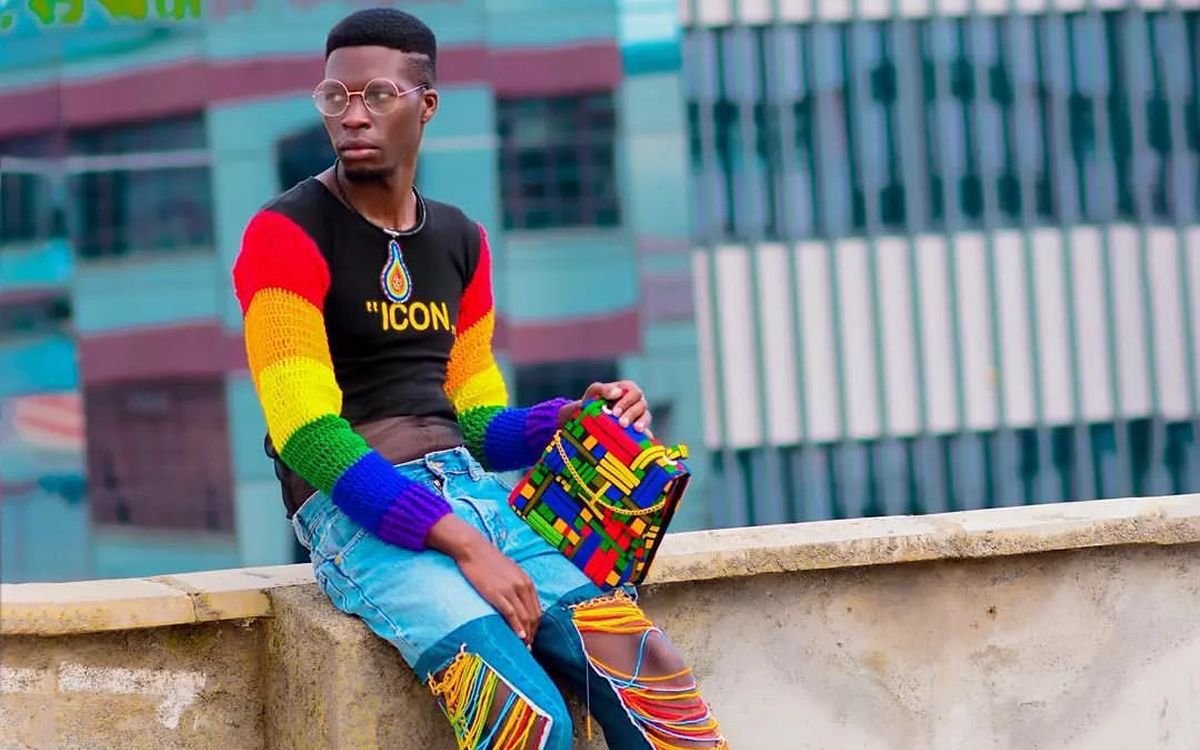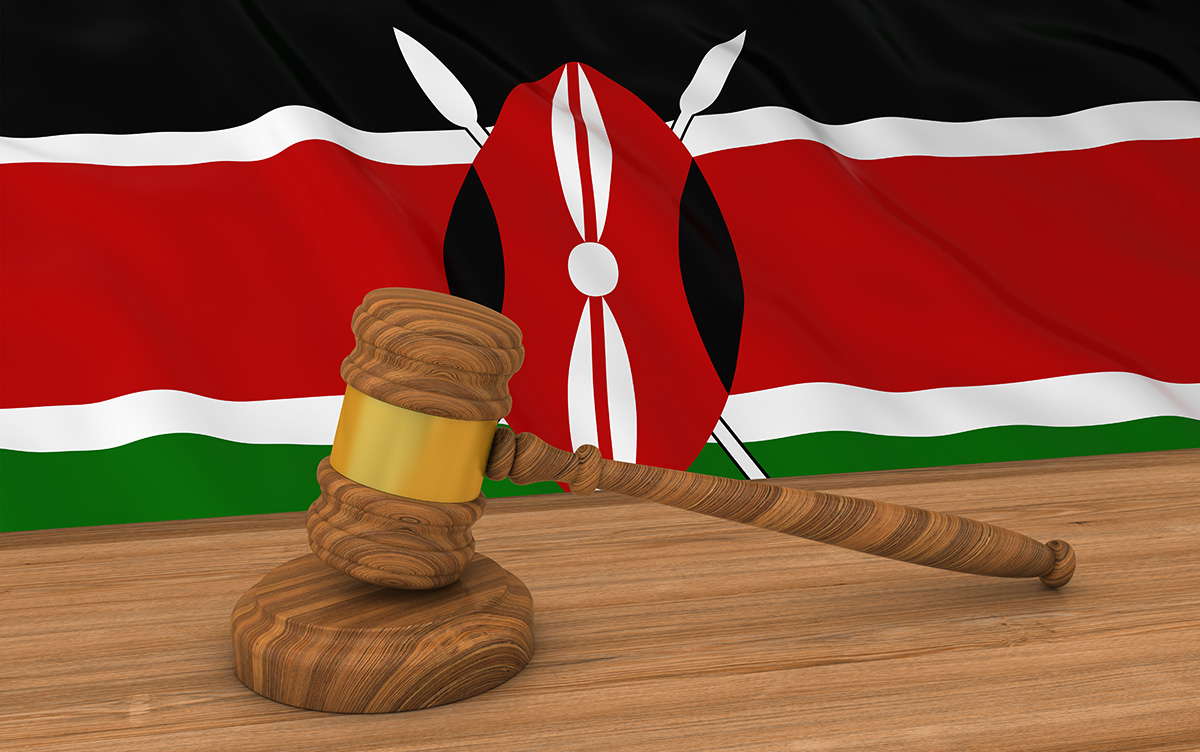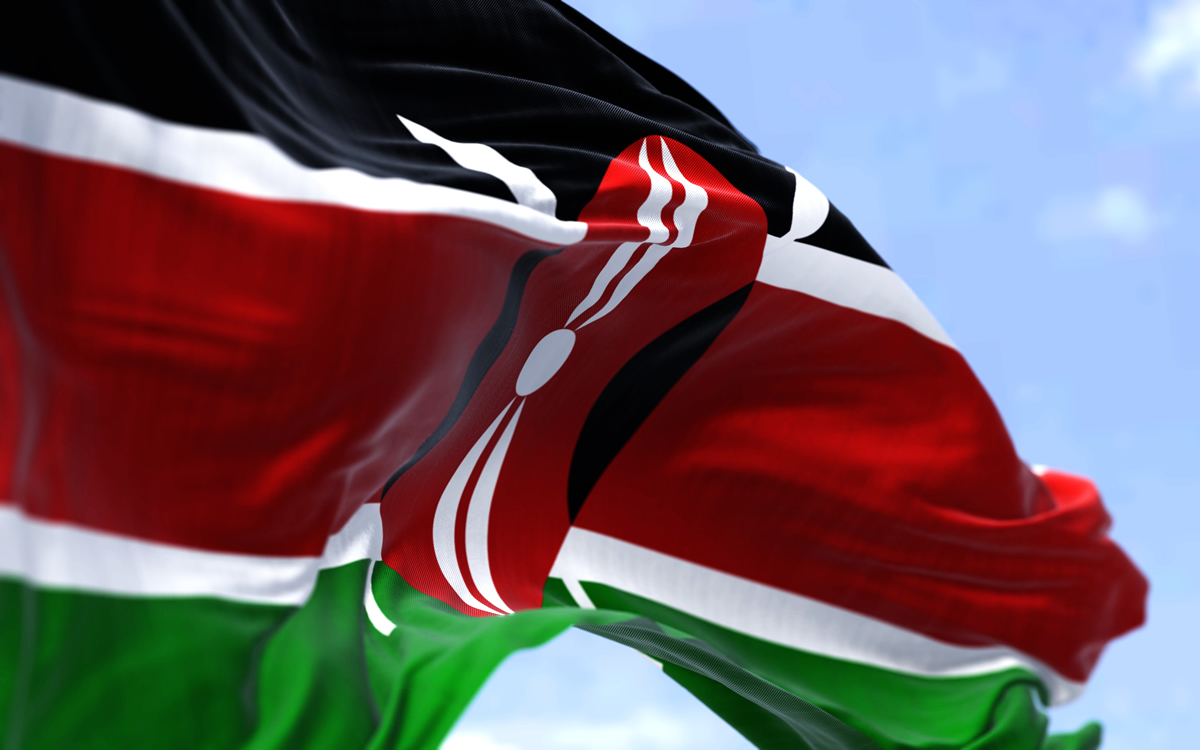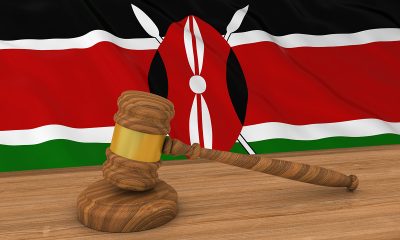Kenya
Man convicted of killing Kenyan activist, sentenced to 50 years in prison
Edwin Chiloba’s partner murdered him in Eldoret on New Year’s Day in 2023

Kenyan queer rights organizations have welcomed the sentencing of a freelance photographer to 50 years in prison for murdering prominent LGBTQ activist and fashion designer Edwin Chiloba nearly two years ago
Justice Reuben Nyakundi on Monday sentenced Jacktone Odhiambo, 25, Chiloba’s partner, after the Eldoret High Court in western Kenya two weeks ago found him guilty of murder.
The 2-year trial, which comprised evidence from 23 witnesses and DNA tests the prosecution presented that placed him at the scene of the crime on New Year’s Day in 2023. Chiloba had disappeared and his body was found stuffed in a metal box that had been dumped along the side of a road.
The court was told that Chiloba and Odhiambo were last seen together at Tamasha Club in Eldoret on the night of Dec. 31, 2022, only for the deceased’s decomposing body to be discovered three days later. His brutal murder sent shockwaves through the LGBTQ community in Kenya and attracted both local and international condemnation and calls for the conviction of perpetrators.
Nyakundi in his sentencing ruling noted the prosecution provided evidence beyond a reasonable doubt and described the brutal murder of Chiloba, 25, as “premeditated, malicious, and aggravated homicide.”
“The footprints of the murder are all traceable to the accused (Odhiambo),” Nyakundi said.
The judge noted Odhiambo showed no respect for the sanctity of life and Chiloba’s brutal killing left a void that cannot be filled.
Odhiambo became the prime suspect after three other accused people were freed due to a lack of evidence linking them to the murder.
Johansen Oduor, the government pathologist who conducted Chiloba’s autopsy, told the court during the trial that the victim had been smothered to death using six pairs of socks stuffed into his mouth and his face was wrapped with a piece of denim.
Despite overwhelming evidence linking Odhiambo to the murder, the court noted the accused did not show any remorse for his actions during the trial and described him as a “vengeful person.” This lack of remorse influenced the severity of his 50-year sentence, even though he fell and wailed after the judge sentenced him.
“The accused deserves the death penalty, which is not implemented in Kenya,” Nyakundi ruled.
Kenya’s Office of the Director of Public Prosecutions acknowledged the judge’s verdict, noting the death sentence “would have been unnecessary” because the country has not executed anyone on death row since 1987. The death penalty, however, has not been abolished from Kenyan criminal laws for offenses like murder, robbery with violence, treason, mutiny, and other crimes.
There have been calls by human rights groups, such as the International Commission for Jurists-Kenya, for Kenya to abolish the death penalty. A bill in parliament would repeal the death penalty.
Additionally, Nyakundi could not sentence Odhiambo to life in prison, which the ODPP also noted as “undesirable” because of the uncertainty surrounding offences that constitute a death sentence.
The National Gay and Lesbian Human Rights Commission in response to Odhiambo’s sentencing said it marks a significant step toward justice for Chiloba, his family, and all LGBTQ people in Kenya, Africa, and around the world.
“This verdict marks a long-awaited moment of accountability, offering a glimmer of justice for Edwin and a reminder that no act of violence against any LGBTQ+ resident of Kenya will go unchallenged or unchecked,” NGLHRC stated.
NGLHRC also remembered Chiloba as a fondly celebrated, vibrant young queer activist, and budding fashion model whose promising future was robbed from him. NGLHRC added his murder also sent a chilling message of fear and injustice to marginalized queer Kenyans.
“We continue to call on the Kenyan government, law enforcement agencies, and the judiciary to strengthen their commitment to addressing violence against LGBTQ+ residents of Kenya as espoused and guided by Resolution 275 of the African Charter on Human and People Rights,” NGLHRC stated.
The Initiative for Equality and Non-Discrimination, a local queer rights group, acknowledged the court’s 50-year sentence for Odhiambo “deemed appropriate for the gravity of the offense.” INEND also applauded NGLHRC and other queer organizations for “pursuing justice for our sibling Chiloba” in the corridors of justice without relenting.
Kenya
Kenyan judge rules government must legally recognize transgender people
Trans athlete challenged arrest, detention, forced medical examination

A Kenyan judge has directed the government to legally recognize transgender people and to guarantee their constitutional rights are protected.
Justice Reuben Nyakundi of the Eldoret High Court in western Kenya in his Aug. 20 judgment holds trans people have the right to determine their “self-identified gender” and the government’s legal system should recognize it.
Nyakundi made the directive after a years-long case of a trans athlete and government agencies over an unwarranted arrest, detention, and forced medical examination to determine her gender in 2019.
Government officials sued the director of Public Prosecutions, attorney general, commissioner general of prisons, and the Moi Teaching and Referral Hospital, which conducted the medical examination following her arrest in Eldoret. The petitioner, only identified as S.C. in the case, was arrested at the same health facility for allegedly impersonating a woman.
“That it is proposed the State consider undertaking appropriate legislative measures to address the rights and protections of individuals within its borders, in line with Article 27(4) of the constitution, which prohibits discrimination on any grounds, including race, sex, social origin, gender, birth, or other status,”Nyakundi ruled. “In this regard, the enactment of a Transgender Protection Rights Act is recommended as a potential mechanism to ensure equal protection and recognition for transgender persons.”
The 34-year-old plaintiff, who is also a board member of Jinsiangu, a local trans rights organization, (“My gender” in Swahili), told the court about the mistreatment to which she was subjected while in custody and demanded compensation for the violation of her rights.
For instance, S.C., who said she realized she was a woman when she was 5-years-old, told the court that police officers forced her to remove her clothes when she was in their custody and ridiculed her for “pretending” to be a woman after they saw male genitals.
She was transferred to a men’s ward before being escorted to her home.
S.C. said officers ransacked it in search of doping drugs they said she used while mocking her female clothes. The plaintiff also stated officers repeatedly slapped her to coerce her to produce her birth certificates and national identity cards. She described the experience as “humiliating and traumatizing.”
The plaintiff also noted that while in the men’s ward, inmates abused and slapped her while some attempted to remove her clothes. They backed off when she screamed to attract officers’ attention before they transferred her to an isolated hallway for her safety.
Nyakundi in his ruling awarded her $10,000 in damages over violation of her privacy and dignity. The court also directed the government to undertake policy reforms to protect the rights of detained trans people in prisons.
“That a declaration be and is hereby made that there is a compelling sense of urgency for the state in the interim to make provision of the physical and structural facilities at the police stations and the prison facilities for these ‘third gender’ who may be in conflict with the law because of their gender identity with a view to guarantee their constitutional rights as envisioned in this judgment,” Nyakundi stated.
He further directed parliament to enact the law that protects and recognizes trans people while also directing the proposed Intersex Persons Bill 2024 be another alternative to identify the rights of the trans community in the country. Intersex people in Kenya are legally recognized as a third gender with an “I” marker, and the community has an intersex representative in the country’s human rights body to champion their interests.
Transgender Education and Advocacy, Jinsiangu, Amka Africa Justice Initiative, and the Kenya Human Rights Commission are among the human rights NGOs that represented S.C. in the case.
Jinsiangu, which works closely with the intersex group, welcomed the decision as one of the “landmark” rulings marking a growing judicial recognition of trans rights in Kenya’s constitutional framework.
“This is the first time a Kenyan court has explicitly ordered the state to create legislation on transgender rights, and a first in the African continent,” Jinsiangu said in a statement. “If implemented, it could address decades of legal invisibility and discrimination faced by transgender persons by establishing clear legal recognition of gender identity, protection against discrimination in employment, housing, healthcare, and education, and access to public services without bias or harassment.”
The trans rights group has committed to monitoring the state’s compliance with the ruling to ensure the legal framework to protect the group is put in place.
“We commit to working hand-in-hand with lawmakers, civil society, and the public to ensure the legislation is inclusive, evidence-based, and enforceable,” Jinsiangu affirmed.
Kenya
Kenyan queer groups want MPs to dismiss anti-LGBTQ petition
Activists claim motion lacks evidence

Kenyan queer rights groups want MPs to dismiss a petition by anti-LGBTQ activists and religious organizations seeking a crackdown on what they describe as a proliferation of homosexuality in the country.
The groups in their written submissions to the National Assembly’s Public Petitions Committee argue the petition presented to parliament in February last year lacks evidence to back up the claims.
“The raft of allegations is presented on their own strength and have no documents to substantiate the said claims,” reads part of the submissions led by KELIN, a coalition of health and human rights bodies. “They claim diseases attributed to the community without any medical proof of the same. The community requests parliament not to be swayed by opinions, preferences, and biases in considering the petition.”
Mohamed Ali, an MP from Kenya’s ruling party that fiercely opposes LGBTQ rights, is the representative of the petitioners as one who presented the measure in the House for probe. The petitioners comprise a group of more than 70 Kenyans from anti-LGBTQ lobby groups and religious bodies under the Kenya Christians Professional Forum and the Muslim Council of Imams and Preachers of Kenya.
The parliamentary committee on Aug. 5 had invited queer rights groups, including KELIN, GALCK+, the Center for Minority Rights and Strategic Litigation, and Initiative for Equality and Non-Discrimination for a hearing.
“We arrived with partners prepared to make submissions opposing the petition by Hon. Mohamed Ali on the so-called ‘proliferation of LGBTQ persons in the country.’ The committee was not ready to proceed and rescheduled to Aug. 7,” CMRSL Legal Manager Michael Kioko said.
The rescheduled meeting was again postponed indefinitely to an unclear date because the Public Petitions Committee was “illegally constituted” and the queer rights groups were told to wait until members elect its leadership to be duly composed.
The prolonged delay by the committee to inquire into the petition, while the groups wait to appear before it, has been further extended after the parliament on Aug. 20 proceeded on a long break of one month.
The LGBTQ rights groups’ submissions the Washington Blade has seen acknowledge the petitioners’ constitutional right to engage parliament on legislative matters as the people’s representatives, while noting the House should not be used as a platform to discriminate against the queer community.
“The community points out that the petitioners, while relying on the Constitution to approach parliament, are deliberately orchestrating unconstitutional actions against the community,” the queer rights groups state.
They also argue that the petitioners’ bid to have the queer rights curtailed violates national laws under the Bill of Rights forbidding any form of discrimination and the international conventions like the Universal Declaration on Human Rights, which Kenya has ratified.
The respondents, while challenging the petitioners over the accusation that the Supreme Court overstretched its mandates in an attempt to legalize homosexuality from its recent rulings in favor of the queer community, argued that the anti-LGBTQ lobby groups were simply “fear-mongering” on the effects of the judges’ decisions. They accuse the petitioners of spreading misinformation and note that the court only granted the queer community their constitutional freedom of association by allowing the registration of their LGBTQ organization blocked by the NGOs’ regulator.
“The community prays that parliament, in considering the petition, is guided by the same ruling as actually summarized and with regard to the right of association and all other rights of the community as members and simply as human beings,” the submissions read.
On the petitioners’ plea for MPs to probe what they describe as an infiltration of the LGBTQ agenda into the Kenyan school books for children to “confuse and mislead them,” the queer rights groups term the claim “far-fetched” for not being backed by evidence from the body overseeing the school curriculum.
The respondents also note the petitioners did not provide any proof of having shared their concerns with the Kenya Institute of Curriculum Development on the alleged LGBTQ materials in school books.
While asking MPs to reject the petition “in toto” over lack of proof, the queer rights groups note that LGBTQ people have faced harassment and systemic derogation of their rights guaranteed under the constitution and various international laws.
“The petitioners have now resorted to parliament to pass their discriminatory agenda against the LGBTQ community,” the submissions read.
The parliamentary committee, when fully constituted to inquire into the petition, will also hear from several government ministers, including Education, Health, Foreign Affairs, Labor and Social Protection, and the Police Inspector General.
Africa
Kenyan, Ugandan groups demand inclusive HIV programs to fill US funding gap
USAID contributed 80 percent of funding to sub-Saharan Africa programs

Seven months since the Trump-Vance administration froze U.S global aid, African countries whose health programs have been seriously affected have devised new ways to address the funding challenge.
The governments’ urgent interventions, however, come with calls of inclusion from queer rights groups in Kenya and Uganda and elsewhere that have also been seriously impacted, warning their sidelining only implies a lack of seriousness to end HIV/AIDS.
“We must fund, protect, and institutionalize community leadership to survive this moment and build systems that endure,” Richard Lusimbo, founder of Uganda Key Populations Consortium, said.
Lusimbo noted community-led organizations, including LGBTQ networks, not only implement public health programs but have co-designed them. They have created referral systems, peer support structures, and delivered medical clinics in remote areas that public systems cannot reach.
“We are not there to patch holes,” said Lusimbo. “We are there to lead. Our leadership must be recognized, resourced, and embedded within national systems, and not only consulted once programs are already designed.”
The queer community’s demand for the government interventions comes amid UNAIDS’s latest warning of a serious global HIV response crisis if U.S funding is halted permanently. The agency’s report said this gap would reverse decades-long gains of saving 26.9 million lives from the virus.
“UNAIDS projections show that a permanent discontinuation of support from the United States President’s Emergency Plan for AIDS Relief (PEPFAR) for HIV treatment and prevention could lead to more than 4 million additional AIDS-related deaths and more than 6 million additional new HIV infections by 2029,” its report states.
The annual UNAIDS reportreleased on July 10 notes the sudden dismantlement of the U.S. Agency for International Development — which was the world’s largest contributor to HIV programs for low- and middle-income countries in sub-Saharan Africa and elsewhere — has disrupted prevention and treatment programs.
USAID contributed 80 percent of the total funding for the aforementioned efforts.
The UNAIDS report also notes half of the 9.2 million people with HIV/AIDS around the world last year who needed treatment but were not receiving it lived in Kenya, Uganda, and other sub-Saharan African countries.
It notes the largest gaps are in diagnosing men living with HIV and linking them to treatment and care, while singling out men who are gay and are members of other key populations as the most affected because of discriminatory laws, violence, and stigma.
“In the absence of a cure for HIV, millions of people will continue to need HIV treatment for many decades to come, but funding losses are destabilizing many treatment programs and the efforts to make them more equitable,” UNAIDS warns.
Key populations, including gay men whose clinics, community-led health groups, and queer rights organizations depend largely on PEPFAR and other foreign aid programs, are reeling from the U.S. funding cuts. UNAIDS data notes around 25 percent of people from vulnerable populations in sub-Saharan Africa are denied access to HIV/AIDS programs, which causes new infections.
GALCK+, a Kenyan queer rights group, noted the freezing of PEPFAR funding has impacted most LGBTQ programs. The result has been fewer HIV testing clinics, queer mental health centers and safe spaces, and hospitals no longer offering gender-affirming care.
“Our lives are on the line, and we must fight for every life. Donate, volunteer, and uplift local LGBTQ+ organizations working on healthcare access and community support,” GALCK+ said.
The queer lobby group also noted forging new partnerships with other international donors is crucial to address the new funding challenge.
Kaleidoscope Trust, a U.K.-based queer rights organization, has stepped in to support LGBTQ groups affected by the U.S. funding freeze.
Although the Global Fund has picked Kenya and Uganda as among the first sub-Saharan African countries to benefit from lenacapavir, a new long-acting injectable PrEP drug, anti-gay discrimination has prevented many people from accessing it.
“This long-acting option has the potential to revolutionize HIV prevention, especially for our community who continue to face stigma or barriers in accessing daily oral PrEP,” Lusimbo said.
Kenyan, Ugandan governments work to bridge funding gap
The PEPFAR funding cut has led to the closure of hundreds of HIV treatment clinics and disrupted the supply of antiretroviral drugs, forcing Kenya and Uganda to reconsider domestic financing through national budgets passed last month.
Kenya, which received a total of $322 million in PEPFAR funding in 2024, increased its national budget for the health sector by $85 million, from $983 million in the previous financial year to $1.07 billion in the current one, in an attempt to bridge the shortfall.
The additional funding resulted from a joint high-level meeting of top officials from national and local governments, health sector players, and relevant communities in March to agree on a sustainable HIV response plan.
The plan entails redesigning medical service delivery to integrate HIV and other diseases in reproductive, maternal, newborn, child, and adolescent health programs. It also involves more domestic funding for HIV products, vaccines, and effective health management systems.
NEPHAK, a Kenyan national network that works with people living with HIV and those at risk of the virus, has called for immediate integration of HIV care into general health care. NEPHAK has also said HIV treatment should be included in the country’s universal health coverage plan.
Uganda also convened a high-level national health financing dialogue in May in response to the U.S funding pause to explore ways of increasing its health sector spending, which has stood between $52-$57 per capita, below the World Health Organization’s recommended $86 minimum.
“Organizations in Uganda are asking for more local money for health and SRHR (sexual and reproductive health rights), better use of budgets, and more community involvement and engagement in all the processes,” stated CEHURD Uganda, a local health social justice rights group. Uganda this financial year increased its health sector’s budget to 8.1 percent from 4 percent in the last financial year, a move lauded by CEHURD as the only way towards having a robust health sector.
-

 Mexico5 days ago
Mexico5 days agoUS Embassy in Mexico issues shelter in place order for Puerto Vallarta
-

 Netherlands4 days ago
Netherlands4 days agoRob Jetten becomes first gay Dutch prime minister
-

 Sports4 days ago
Sports4 days agoMore than a dozen LGBTQ athletes medal at Olympics
-

 Books3 days ago
Books3 days agoNew book profiles LGBTQ Ukrainians, documents war experiences




















